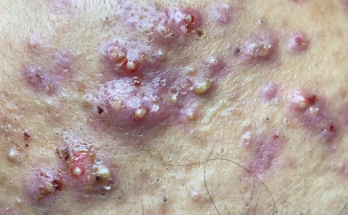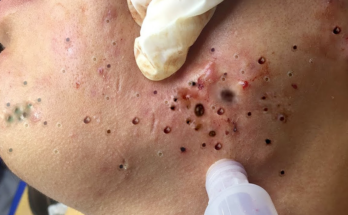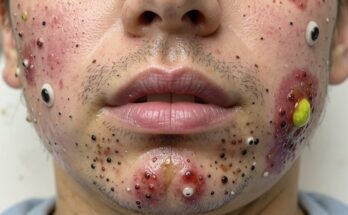Conquer Acne: A Comprehensive Guide to Clear Skin
Acne affects a vast majority of young adults, leaving many seeking solutions beyond expensive and potentially irritating conventional treatments. This detailed guide explores various approaches to acne management, from establishing a solid skincare routine to understanding when professional help is necessary.
Understanding Acne: Causes and Types
What is Acne?
Acne vulgaris, commonly known as acne, is a frustrating skin condition stemming from blocked pores. These blockages occur when a combination of oil (sebum) produced by sebaceous glands and dead skin cells clog the hair follicles. While prevalent during adolescence due to hormonal fluctuations and increased sebum production, acne can persist well into adulthood. The severity of acne varies, ranging from mild blackheads and whiteheads to more severe forms like cystic acne involving painful, inflamed lesions.
What Causes Acne?
Several factors contribute to acne development. Hormonal changes, particularly during puberty, pregnancy, or menstruation, significantly influence sebum production. Genetics play a role, as some individuals are predisposed to acne due to inherited traits influencing sebum production and skin cell turnover. Certain bacteria, primarily Cutibacterium acnes, thrive in blocked pores, contributing to inflammation and infection. Finally, lifestyle choices, such as diet and stress levels, can also affect acne severity.
Effective Acne Management Strategies
This section outlines practical steps to manage and potentially clear up your acne. Remember consistency is key!
1. Building a Rock-Solid Skincare Routine
A consistent skincare routine is fundamental to acne management. This involves gentle cleansing, targeted treatments, and hydration without clogging pores.
Morning Routine:
- Gentle Cleansing: Begin with a non-comedogenic cleanser to remove excess oil and impurities without stripping the skin’s natural moisture barrier.
- Targeted Treatment (Optional): Apply benzoyl peroxide or salicylic acid to combat bacteria and unclog pores.
- Hydration: Use a lightweight, oil-free moisturizer to prevent dryness.
- Sun Protection: Apply a broad-spectrum sunscreen (SPF 30 or higher) to shield your skin from UV damage, a known acne aggravator.
Evening Routine:
- Thorough Cleansing: Remove makeup, sunscreen, and dirt accumulated throughout the day using the same gentle cleanser.
- Exfoliation (2-3 times per week): Chemical exfoliants containing salicylic acid or glycolic acid help remove dead skin cells and prevent blockages. Start slowly to avoid irritation.
- Targeted Treatment: Apply retinoids (like adapalene) to promote cell turnover and prevent new breakouts. Remember, avoid combining retinoids and benzoyl peroxide simultaneously to minimise irritation. Use them at different times of day.
- Hydration: Finish with a hydrating, non-comedogenic moisturizer.
2. Harnessing the Power of Topical and Systemic Treatments
Various topical and systemic treatments can significantly impact acne.
Topical Treatments:
- Benzoyl Peroxide: Kills acne-causing bacteria and reduces inflammation.
- Salicylic Acid: Exfoliates and unclogs pores.
- Retinoids (e.g., Adapalene, Tretinoin): Increase cell turnover, preventing clogged pores.
- Topical Antibiotics (e.g., Clindamycin): Reduce bacteria and inflammation.
Systemic Treatments (Prescription Only):
- Oral Antibiotics (e.g., Doxycycline, Minocycline): Treat moderate to severe acne by reducing bacteria.
- Oral Isotretinoin (Accutane): A potent medication reserved for severe, treatment-resistant acne. Requires close monitoring due to potential side effects.
3. Smart Product Choices: The “Non-Comedogenic” Factor
Always choose skincare and makeup products labeled “non-comedogenic.” This means they’re formulated to minimize pore blockage. Look for beneficial ingredients like hyaluronic acid, ceramides, and niacinamide, which hydrate and soothe without triggering breakouts.
4. Lifestyle Adjustments: Holistic Acne Care
Lifestyle plays a crucial role in acne management.
- Diet: Limiting high-glycemic foods and dairy products may help some individuals. Consult a nutritionist or dermatologist for personalized dietary advice.
- Hydration: Drink plenty of water to keep your skin hydrated and aid in toxin removal.
- Sleep: Aim for 7-9 hours of quality sleep to allow your skin to repair itself.
- Stress Management: Practice stress-reducing techniques like yoga, meditation, or exercise. High stress levels can exacerbate acne.
5. Maintaining impeccable Skin Hygiene
Prevent the spread of bacteria and oil to your face:
- Avoid Touching Your Face: Hands carry bacteria that worsen acne.
- Clean Bedding and Towels Regularly: Wash pillowcases and towels at least once a week.
- Disinfect Your Phone: Regularly clean your phone screen to remove bacteria.
When Professional Help is Needed
If over-the-counter treatments fail to improve your acne after 2-3 months, or if you experience severe breakouts, scarring, or significant emotional distress, seek a dermatologist’s consultation. They can provide personalized treatment plans, including prescription medications and potentially professional procedures.
Over-the-Counter (OTC) and Prescription Acne Treatments: A Closer Look
This section provides specific examples, but always consult a doctor or pharmacist before starting any new treatment.
Over-the-Counter Treatments:
- Benzoyl Peroxide: Widely available in various concentrations (2.5% – 10%). Kills bacteria and reduces inflammation.
- Salicylic Acid: Found in cleansers, toners, and spot treatments. Exfoliates and unclogs pores.
- Adapalene (Differin): A retinoid available without a prescription. Promotes cell turnover.
Prescription Treatments:
- Topical Antibiotics (e.g., Clindamycin, Erythromycin): Reduce bacterial load.
- Oral Antibiotics (e.g., Doxycycline, Minocycline): Fight bacteria systemically.
- Oral Isotretinoin (Accutane): A powerful medication for severe acne, but carries potential side effects, necessitating close medical supervision.
By following these strategies and seeking professional advice when needed, you can take control of your acne and work towards achieving clearer, healthier skin. Remember, patience and consistency are key to success.









